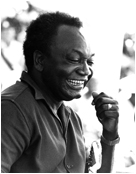A part of Eastern Africa, the territory of what is now Kenya has seen human habitation since the beginning of the Lower Paleolithic. The Bantu expansion from a West African centre of dispersal reached the area by the 1st millennium AD. With the borders of the modern state at the crossroads of the Bantu, Nilo-Saharan and Afro-Asiatic ethno-linguistic areas of Africa, Kenya is a truly multi-ethnic state.

Daniel Toroitich arap Moi is a former Kenyan politician who served as the second President of Kenya from 1978 to 2002. Through popular agitation and external pressures, he was forced to allow multiparty elections in 1991; he led his party, KANU, to victory in the 1992 and 1997 elections. Prior to becoming President, he served as the third Vice President of Kenya from 1967 to 1978.

Elections in Kenya take place within the framework of a multi-party democracy and a presidential system. The President, Senate and National Assembly are directly elected by voters, with elections organised by the Independent Electoral and Boundaries Commission (IEBC).

William Kipchirchir Samoei Arap Ruto is a Kenyan politician who has been Deputy President of Kenya since 2013. He served as the Acting President of Kenya between 5 and 8 October 2014 while President Uhuru Kenyatta was away at the Hague.He previously served in various ministerial positions including the Ministry of Home Affairs, the Ministry of Agriculture and the Ministry of Higher Education Science and Technology. He was Secretary General of KANU, the former ruling political party, and MP for Eldoret North Constituency between December 1997 and January 2013. He won the seat in the 1997 Kenyan election after defeating Reuben Chesire. He was appointed to the position of Assistant Minister in the Office of the President by President Daniel arap Moi in 1998. He was promoted to be Minister for Home Affairs in August 2002. He also previously served as the Chairman of the Parliamentary Select Committee on Constitutional Reform in the 9th Parliament.

The Orange Democratic Movement (ODM) is a centre-left political party in Kenya. It is the successor of a grassroots people's movement which was formed during the 2005 Kenyan constitutional referendum campaign. This movement separated in August 2007 into the Orange Democratic Movement Party of Kenya and the Wiper Democratic Movement – Kenya.
Gideon Moi is a Kenyan politician who has served in the Senate of Kenya, representing Baringo County, since 2013. He was elected with a landslide win of over 80%, trouncing his opponent Jackson Kosgei. He is also the Chairman of the Kenya African National Union (KANU), which for decades was the ruling party in Kenya. He is the youngest son of Kenya's second president, Daniel arap Moi, and Lena Moi.
This page contains detailed results of the parliamentary election that was held as part of the Kenyan general election in December 2007.

General elections were held in Kenya on 27 December 2007, electing the President, National Assembly and local councils.

Majimbo is a Swahili term that is commonly used in Kenya to refer to the idea of political devolution of power to the country's regions. It is alleged by critics, including former vice-president Oginga Odinga in his book Not Yet Uhuru, to have been coined by European settlers in Kenya's White Highlands region, around the time of independence in 1963, who preferred to retain an autonomous, ethnically-based governance over the region. It has also been alleged, by some of its critics, that majimbo is a pretext for the type of communal violence that has plagued Kenya's elections especially since the return of multiparty politics. In his auto biography titled Illusions of Power, one G.G Kariuki, a long serving KANU Member of Parliament, goes as far as to allege the existence of a plot to instigate communal violence in Kenya's independence elections by supporters of a Majimbo system of government.
Henry Kiprono Kosgey is a Kenyan politician who was a member of parliament for Tinderet Constituency and was a Minister for Industrialization. He was also the Chairman of the Orange Democratic Movement (ODM);The longest serving Mp for Tinderet who is also renowned large scale owner of tea farms.He was defeated in his bid to be elected on an ODM Party as a Nandi County Senator allegedly for bring in the wrong party. He is currently the most favoured to take the governors sit in the upcoming elections.
The Kenya People's Union (KPU) was a socialist political party in Kenya led by Oginga Odinga. The party was banned in 1969.

Ronald Gideon Ngala (1923–1972) was a Kenyan politician who was the leader of the Kenya African Democratic Union political party from its creation in 1960 until its dissolution in 1964.
The Truth, Justice and Reconciliation Commission of Kenya (TJRC) was established in 2008. Kenya’s modern history has been marked not only by liberation struggles but also by ethnic conflicts, semi-despotic regimes, marginalization and political violence, including the coup d'état of 1982, the Shifta War, and the 2007 Post-election violence.
Joseph Martin Shikuku was a Kenyan politician.

A series of by-elections were held in Kenya on 11 and 12 June 1966, becoming known as the "little general election". They followed the defection of 29 members of the Kenya African National Union (KANU) to establish the Kenya People's Union. As a result, the KANU government passed a constitutional amendment to force the MPs to seek re-election. Although the KPU received the most votes in the by-elections, KANU won more seats.
Amin Walji was Kenyan Asian politician who was elected as the Kenya African National Union (KANU) representative for the Westlands Constituency in the Kenyan general election, 1992, the first multi-party elections since independence in 1963.

A general election was held in the U.S. state of Vermont on November 6, 2018. All of Vermont's executive officers were up for election as well as Vermont's Class I Senate seat and at-large seat in the United States House of Representatives. Primary elections were held on August 14, 2018.













